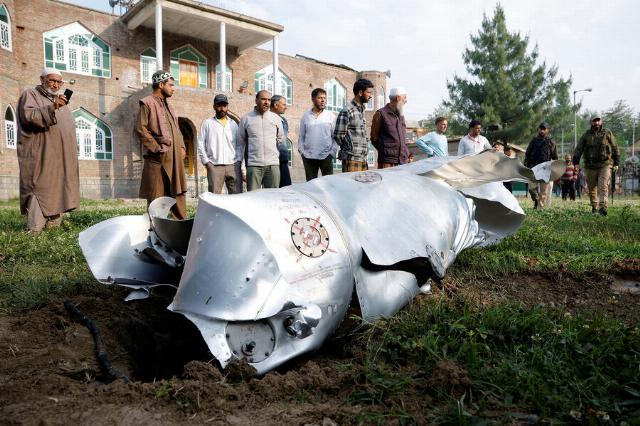Colonel Khodarenok: the conflict between India and Pakistan will not reach a nuclear war
The armed conflict between India and Pakistan has significantly escalated: The sides have already exchanged missile and air strikes. How far this armed confrontation can go, whether New Delhi and Islamabad can switch to using nuclear weapons and what the red powder has to do with it - in the material of the military observer "Gazeta.Ru", retired Colonel Mikhail Khodarenka.
History of the conflict
India and Pakistan have been at war with each other more than once over the past 80 years. Apart from minor border incidents, at least three major wars can be distinguished: the First Indo-Pakistani War (also known as the First Kashmir War) - 1947-1949; the Second Indo-Pakistani War (Second Kashmir War) - 1965; the Third Indo-Pakistani War - 1971. The last armed confrontation was connected with the war of independence of Bangladesh.
In addition to the three wars, there was a border conflict on the Siachen Glacier in 1984. In 2003, a ceasefire agreement came into force in Siachen.
In 1999, Pakistan provoked the Kargil war, which was not widespread. Officially, Islamabad denies the involvement of its armed forces in this war.
In February 2019, another conflict occurred due to the terrorist attack committed on February 14 in the state of Jammu and Kashmir, which killed 45 members of the Central Reserve Forces of the Indian Police.
Operation Sindur
In April 2025, due to the murder of Indian tourists in the state of Jammu and Kashmir, the Indian Armed Forces announced Operation Sindoor (the name of the Indian red ritual powder that married women apply to the parting of their hair and forehead).
According to The Times of India, sindoor is a sign of married Hindu women. Witnesses said that the terrorists targeted and shot Hindu men.
"The name of the operation is directly related to the image of the "grieving wife," which became a symbol of the terrorist attack in Pahalgam. The image of Himanshi Narwhal sitting next to her deceased husband, Navy officer Lieutenant Vinay Narwhal, has become an image of tragedy. She was married for only six days and came to Kashmir for her honeymoon," the newspaper notes.
The nuclear factor
In the May 2025 confrontation, unlike all previous wars and conflicts, there is a new factor - currently India and Pakistan are nuclear missile powers.
On May 18, 1974, India conducted its first (secret) nuclear weapons test, which was dubbed the "Smiling Buddha." The second series of nuclear weapons tests in Delhi was conducted in 1998 (Operation Shakti).
The main means of delivering nuclear warheads in India include: short-range ballistic missiles Agni-I (700 km); medium-range ballistic missiles Agni-II (2500 km); medium-range ballistic missiles Agni-III (3500 km); intercontinental ballistic missiles Agni-IV(4,000 km) and Agni-V (approximately 8,000 km); K-15 Sagarika submarine-launched ballistic missiles on Arikhant-class submarines, Su-30MKI multifunctional aircraft and Dassault Mirage 2000.
Regarding Pakistan, on May 28, 1998, just a few weeks after India conducted its second nuclear test (Operation Shakti), Pakistan detonated five nuclear devices in the Ras Koh Mountains in the Chagai region of Balochistan. This operation in Islamabad was called Chagai-1.
Pakistan has several types of mobile ballistic missiles as part of its strategic nuclear forces: Ghaznavi, Abdali, Shaheen-I, Shaheen-II, Shaheen-III. The latter have a range of up to 2,750 km and can hit targets throughout India. Nuclear weapons delivery vehicles also include the Hatf, Babur and Raad cruise missiles, and F-16 and JF-17 fighter jets.
According to a study by the Federation of American Scientists (FAS), as of early 2025, India has 180 nuclear warheads, while Pakistan has 170. This is quite enough to create a total hell on the entire Hindustan peninsula. The exchange of nuclear missile strikes by India and Pakistan in an extremely densely populated area (more than 21 million people live in Mumbai alone in India) will lead to millions of casualties.
For example, Pakistan will not start an escalation of the conflict with India if it stops its military operation and other aggressive actions. This has already been stated by the country's Defense Minister Khawaja Asif.
He stressed that Pakistan is not taking any action against India. If New Delhi retreats, Islamabad will certainly cease its military operations.
So, most likely, after the exchange of conventional weapons, the parties will begin consultations and negotiations. And the nuclear arsenals of the parties will serve as a strong deterrent in this case.
The opinion of the author may not coincide with the position of the editorial board.
Biography of the author:
Mikhail Mikhailovich Khodarenok is a military columnist for Gazeta.Ru", retired colonel.
He graduated from the Minsk Higher Engineering Anti-Aircraft Missile School (1976), the Military Air Defense Command Academy (1986).
Commander of the S-75 anti-aircraft missile division (1980-1983).
Deputy commander of the anti-aircraft missile regiment (1986-1988).
Senior Officer of the General Staff of the Air Defense Forces (1988-1992).
Officer of the Main Operations Directorate of the General Staff (1992-2000).
Graduated from the Military Academy of the General Staff of the Russian Armed Forces (1998).
Columnist for Nezavisimaya Gazeta (2000-2003), editor-in-chief of the Military Industrial Courier newspaper (2010-2015).
Mikhail Khodarenok

